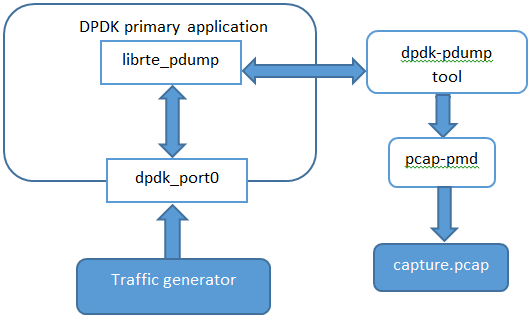This article describes how the Data Plane Development Kit (DPDK) packet capture framework is used for capturing packets on the DPDK ports. It is written with users of DPDK in mind who want to know more about the feature and for those who want to monitor traffic on DPDK-controlled devices.
The DPDK packet capture framework was introduced in DPDK v16.07. The DPDK packet capture framework consists of the DPDK pdump library and DPDK pdump tool.
DPDK pdump Library and pdump Tool
The librte_pdump library provides the APIs required to allow users to initialize the packet capture framework and to enable or disable packet capture. The library works on a client/server model and its usage is recommended for debugging purposes.
The ‘dpdk-pdump’ tool runs as a DPDK secondary process and is capable of enabling or disabling packet capture on the DPDK ports. The tool is developed based on the librte_pdump library. The dpdk-pdump tool provides command-line options with which users can request enabling or disabling of the packet capture on DPDK ports. The dpdk-pdump tool can only be used in conjunction with a primary application which has the packet capture framework initialized already.
The application which initializes the packet capture framework will act as a server and the application that enables or disables the packet capture will act as a client. The server sends the Rx and Tx packets from the DPDK ports to the client.
The DPDK ‘testpmd’ application is modified to initialize the packet capture framework and act as a server, and the dpdk-pdump tool acts as a client. To view Rx or Tx packets of testpmd, the application should be launched first, and then the dpdk-pdump tool. Packets from the testpmd will be sent to the tool, which then sends them on to the pcap pmd device and that device writes them to the pcap file or to an external interface depending on the command-line option used.
Test Environment
Figure 1 shows the usage of the dpdk-pdump tool for packet capturing on the DPDK port.

Figure 1: Packet capturing on DPDK port using the dpdk-pdump tool.
Configuration Steps
The following steps demonstrate how to run the dpdk-pdump tool to capture Rx side packets of dpdk_port0 and inspect them using tcpdump.
- Build DPDK as described in the installation docs. Make sure DPDK is built with the following configuration options set:
CONFIG_RTE_LIBRTE_PMD_PCAP=y CONFIG_RTE_LIBRTE_PDUMP=y - Launch testpmd as the primary application:
sudo ./app/testpmd -c 0xf0 -n 4 -- -i --port-topology=chained - Launch the pdump tool as follows:
sudo ./build/app/dpdk-pdump -- --pdump 'port=0,queue=*,rx-dev=/tmp/capture.pcap' - Send some traffic to dpdk_port0 via a traffic generator.
- Inspect the contents of capture.pcap using a tool that can interpret pcap files, for example tcpdump:
$tcpdump -nr /tmp/capture.pcap reading from file /tmp/capture.pcap, link-type EN10MB (Ethernet) 11:11:36.891404 IP 4.4.4.4.whois++ > 3.3.3.3.whois++: UDP, length 18 11:11:36.891442 IP 4.4.4.4.whois++ > 3.3.3.3.whois++: UDP, length 18 11:11:36.891445 IP 4.4.4.4.whois++ > 3.3.3.3.whois++: UDP, length 18
Conclusion
In this article we described the DPDK pdump library and the pdump tool and how they can be used to capture traffic passing on DPDK ports.
Additional Information
More details on librte_pdump library and dpdk-pdump tool can be found at following links.
The DPDK Programmer's Guide has a section dedicated to the librte_pdump library, which contains more information about how it works.
The Sample Applications Users Guide has a section dedicated to the dpdk-pdump application.
The article DPDK Pdump in Open vSwitch* with DPDK describes use of dpdk-pdump for DPDK devices in OvS-DPDK configurations.
If you have questions regarding usage, feel free to follow up with an email query at users@dpdk.org.
About the Author
Reshma Pattan is a Network Software Engineer at Intel Corporation. Her work primarily focuses on data plane library development for DPDK. Her contributions to DPDK include the addition of the packet reorder library, the packet ordering sample application, the pdump library, and the dpdk-pdump tool.
"